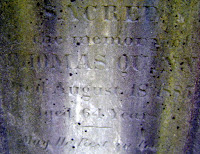 |
Tombstone for
Paul E. Tarver |
A simple inquiry regarding Paul E. Tarver started me on a quest to find out more about him. A piece in the
Historical Collections of the Georgia Chapters, Daughters of the American Revolution (Volume IV -- Old Bible Records & Land Lotteries, © 1932) proved to be fruitful. Information from a Bible of the General Hartwell Hill Tarver family was listed. This gentleman was Paul's father.
Hartwell Hill Tarver was a son of Andrew Tarver and Elizabeth Hartwell, born 1791 in Brunswick County, Virginia. He married Ann R. Wimberly 15 May 1823 and had Paul E. in 1824.
Newspapers in January 1851 declared Hartwell H. Tarver the wealthiest man in Georgia:
- Gen. Hartwell H. Tarver, of Twiggs Co, Georgia, is the largest slaveholder, if not the wealthiest man in the State. He owns a thousand negroes and fifty thousand acres of land, divided into ten plantations, in Twiggs, Pulaski, Houston and Baker counties, yielding two thousand bales of cotton annually...He recently added to his estate a tract of 2350 acres, in Burke county...
In 1850, Paul E. Tarver was listed as a Planter in the Baker County, Georgia Federal census. I would not be surprised if he was planting on lands of his father.
Hartwell H. Tarver died 19 November 1851. His son Paul passed away less than seven years later. Given the wording used in notices of his estate sale, I think the land Paul amassed was possibly inherited by him from his father.
Macon Weekly Telegraph, Georgia
22 November 1859
"
150 Negroes for Sale
AT PUBLIC OUT-CRY, IN THE
CITY OF ALBANY.
IN pursuance of the last will and testament of Paul E. Tarver, late of Dougherty county, dec'd, we will expose for sale, at public out-cry, to the highest bidder, on
THURSDAY, THE 29th DAY OF DEC., 1859, and from day to day until the sale is completed, before the Court House door in the city of Albany -- One Hundred and Fifty likely Negroes -- valuable plantation hands, belonging to the estate of the said Paul E. Tarver. Also, at the PLANTATION of the said Estate, five miles west of Albany, all the farm stock of said Estate, consisting of a large lot of Horses and Mules, Cattle, Hogs, Corn, Fodder, Wagons, and farming stock of every description. The sale of the Negroes at Albany, will take place on the 28th, and then the other property at the plantation. Terms liberal, and made known on the day of the sale.
HENRY TARVER, Ex'r
C. C. TARVER, Exr'x.
 |
| (Macon Weekly Telegraph, 25 January 1859) |
"IN pursuance of the last will and testament of the late Paul E. Tarver, will be sold on the 1st Tuesday in February next, before the Court House door of Dougherty County, at public outcry, the real estate of the said Paul E. Tarver, deceased, situated in the county of Dougherty. Said estate consists of FIVE THOUSAND ACRES of the most valuable COTTON LANDS in South Western Georgia, having been originally selected by the late Gen. Hartwell Tarver."
The notice goes on to describe the lands divided into three plantations: "Porter Place," "Home Place," and "Mill Place."
Since Paul Tarver's tombstone states he died "at his residence in Dougherty Co. June 19, 1858," the plantation called "Home Place" was probably just that.
[It might be important to note: Dougherty County was formed in 1853 from Baker County, so it is doubtful Paul ever moved. The county name just changed.]
All this information is great, but I still questioned as to why Mr. Paul E. Tarver was laid to rest in Rose Hill Cemetery at Macon, GA. I think the answer lies in his wife: Cinderella Crocker Solomon was possibly connected by her father to Peter Solomon, a pioneer resident of Macon. Her father or Peter just might be the owner of the lot in which Paul Tarver (as well as two if his children and wife Cinderella) was laid to rest. Also buried in the same plot is James C. Solomon, died 1861 at age 24 years. He might be Cinderella's brother.
If anyone can tell me for certain how these individuals are connected, I'd truly appreciate a comment.






















